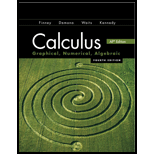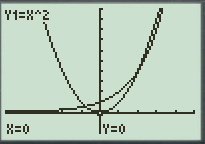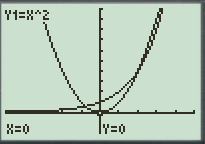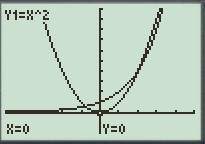
Concept explainers
(a)
To find: The graphs of the function
(a)
Answer to Problem 47E
The graphs of the function
Explanation of Solution
Given information: The functions are
Calculation:
To graph the functions
First press “ON” button on graphical calculator, press
The display will show the equations,
Press the
Now, press the

Figure (1)
In the graph window it appears that functions cross each other twice. But actually functions cross each other three times.
(b)
To find: Comparison of the change in values of
(b)
Answer to Problem 47E
The below table shows the changes in the values of
| Change in values of | Change in values of | |||
Explanation of Solution
Given information:
The functions are
Calculation:
The functions are given as
The below table shows all the data of the curves:
| Change in values of | Change in values of | |||
The minimum value of
(c)
To find: The values of
(c)
Answer to Problem 47E
The values of
Explanation of Solution
Given information:
The functions are
Calculation:
To graph the functions
First press “ON” button on graphical calculator, press
The display will show the equations,
Press the
Now, press the

Figure (1)
It is observed from graph that both the curves intersect at three points
Therefore, the values of
(d)
To find: The values of
(d)
Answer to Problem 47E
The values of
Explanation of Solution
Given information:
The functions are
Calculation:
To graph the functions
First press “ON” button on graphical calculator, press
The display will show the equations,
Press the
Now, press the

Figure (1)
It is observed from graph that the curve
Therefore, the values of
Chapter 1 Solutions
Calculus 2012 Student Edition (by Finney/Demana/Waits/Kennedy)
Additional Math Textbook Solutions
Basic Business Statistics, Student Value Edition
A First Course in Probability (10th Edition)
Elementary Statistics (13th Edition)
College Algebra (7th Edition)
Calculus for Business, Economics, Life Sciences, and Social Sciences (14th Edition)
Thinking Mathematically (6th Edition)
- A helicopter pilot needs to travel to a regional airport 25 miles away. She flies at an actual heading of N16.26°E with an airspeed of 110 mph, and there is a wind blowing directly east at 20 mph. (a) Determine the compass heading that the pilot needs to reach her destination. (b) How long will it take her to reach her destination?arrow_forwardQuestion 3. the given integral is convergent or divergent: Use the comparison test to determine whether or not * sin*(x + 1) 7x3 (a) |. d.x g8 + x4 + 1 -dx (b) 2.x4 + x + 1arrow_forward-d.x tan xarrow_forward
- 48. f(x) = { 4 x if x < 2 2x 2 if x 2arrow_forwardГ 49. -x+1 if x 1 Answer ->arrow_forwardA Content X MindTap - Cengage Learning x Function Evaluations x + /ui/evo/index.html?elSBN=9780357038406&id=339416021&snapshotld=877369& GE MINDTAP , Limits, and the Derivative ⭑ វា a ANSWEI 16. Refer to the graph of the function f in the following figure. कर्ट AA C 54 -3-2 7 7 Ay 6. S 5. y=f(x) 4 3. 2. 1 -3- 34567 8 00 9 10 a. Find the value of ƒ (7). b. Find the values of x corresponding to the point(s) on the graph of ƒ located at a height of 5 units from the x-axis. c. Find the point on the x-axis at which the graph of ƒ crosses it. What is the value of f (x) at this point? d. Find the domain and range of f. MacBook Pro G Search or type URL + > % Λ & 5 6 7 29 ( 8 9 0arrow_forward
- Morgan F. - C X A Courses MindTap - Cengage Learning Х Domain of Square Roots X + gage.com/static/nb/ui/evo/index.html?elSBN 9780357038406&id=339416021&snapshotld=877369& CENGAGE MINDTAP 2: Functions, Limits, and the Derivative 47. x if x < 0 f(x) = 2x+1 if x 0 Answerarrow_forwardA Content MindTap - Cengage Learning × Function Evaluations * + c/nb/ui/evo/index.html?elSBN 9780357038406&id=339416021&snapshotld=877369& GAGE MINDTAP ions, Limits, and the Derivative 15. Refer to the graph of the function f in the following figure. 6 y = f(x) 5 4+ 3- 2- 1 + 2 -1 3 4 5 6 a. Find the value of ƒ (0). Answer-> b. Find the value of x for which (i) f (x) = 3 and (ii) f (x) = 0. Answer ▾ c. Find the domain of f. Answer + d. Find the range of f. Answer+ MacBook Proarrow_forwardAnswer-> 12. Let g be the function defined by Find g(-2), g(0), g (2), and g (4). - +1 if x <2 g(x) = √√√x-2 if x 2arrow_forward
 Calculus: Early TranscendentalsCalculusISBN:9781285741550Author:James StewartPublisher:Cengage Learning
Calculus: Early TranscendentalsCalculusISBN:9781285741550Author:James StewartPublisher:Cengage Learning Thomas' Calculus (14th Edition)CalculusISBN:9780134438986Author:Joel R. Hass, Christopher E. Heil, Maurice D. WeirPublisher:PEARSON
Thomas' Calculus (14th Edition)CalculusISBN:9780134438986Author:Joel R. Hass, Christopher E. Heil, Maurice D. WeirPublisher:PEARSON Calculus: Early Transcendentals (3rd Edition)CalculusISBN:9780134763644Author:William L. Briggs, Lyle Cochran, Bernard Gillett, Eric SchulzPublisher:PEARSON
Calculus: Early Transcendentals (3rd Edition)CalculusISBN:9780134763644Author:William L. Briggs, Lyle Cochran, Bernard Gillett, Eric SchulzPublisher:PEARSON Calculus: Early TranscendentalsCalculusISBN:9781319050740Author:Jon Rogawski, Colin Adams, Robert FranzosaPublisher:W. H. Freeman
Calculus: Early TranscendentalsCalculusISBN:9781319050740Author:Jon Rogawski, Colin Adams, Robert FranzosaPublisher:W. H. Freeman
 Calculus: Early Transcendental FunctionsCalculusISBN:9781337552516Author:Ron Larson, Bruce H. EdwardsPublisher:Cengage Learning
Calculus: Early Transcendental FunctionsCalculusISBN:9781337552516Author:Ron Larson, Bruce H. EdwardsPublisher:Cengage Learning





